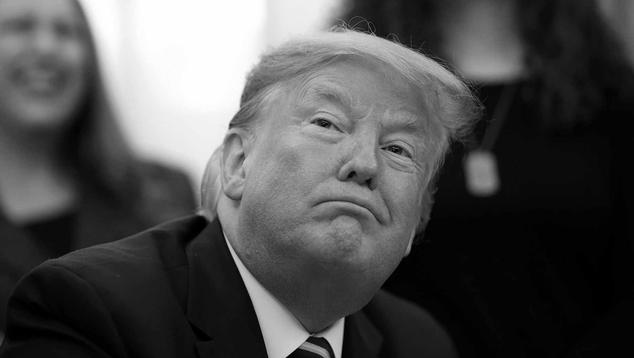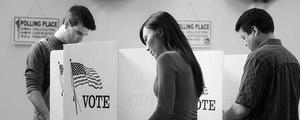Political observers most frequently focus on presidential job approval and "horse race" questions to estimate the probability of an incumbent president's getting reelected. But there is a broader context that forms the backdrop of incumbent reelection campaigns -- what Americans are thinking and feeling about the world in general. At this juncture in the campaign, some parts of this broad context form a positive environment for President Donald Trump's reelection effort, while others suggest a more challenging scenario.
Public Opinion Contexts That Are Positive for Trump
1. Americans are quite positive on a relative basis about the status of the U.S. economy. Gallup's basic indicator of confidence in the U.S. economy is the best it has been in twenty years, and indicators of Americans' views of their personal finances are at or near all-time highs.
Most political analysts recognize the paramount importance of the economy in a president's reelection probabilities. This is particularly true for Trump; his campaign is pushing the positive economy as the primary focus of his campaign. The economic confidence data, for the most part form a strongly propitious environment for this reelection positioning.
2. Americans report being more satisfied with the way things are going in the U.S. than at any point in the last 15 years. This provides a positive context for Trump's reelection campaign, although, on an absolute basis, the 41% who are satisfied remains well below majority level.
Additionally, six in 10 Americans say they are better off than they were three years ago (an indicator popularized by candidate Ronald Reagan in 1980 when he asked a variant of that question about the years of the Carter administration) and this, too, is a currently positive indicator for Trump's reelection positioning.
3. Americans, as a whole, remain skeptical about the idea that more big government is the way to address the nation's pressing issues. My review of the data shows there is little evidence of strong majority support for the government to become bigger and more active in solving the nation's problems.
This is important because the current Democratic presidential contenders are advocating for a significantly increased government role in addressing human needs. This is particularly true of current front-runner Bernie Sanders, who calls for increased government intervention in order to provide healthcare, education, housing and jobs "for all" -- and in many other ways advocates government redistribution of power and wealth.
The fact that Americans are not strongly on board with this broad concept is a plus for Trump's reelection campaign, which is calling the Democrats' proposals "big government socialism" and clearly attempting to play off of Americans' wariness about proposals that the government is the primary panacea for the nation's ills.
Public Opinion Contexts That Appear Less Positive for Trump
Trump is clearly out of sync with majority public opinion on a number of key policy issues, a situation which, on its face, seems less than encouraging for Trump's reelection probabilities.
But, we know that in many ways, Trump's political actions and reelection efforts are indifferent to broad, overall public opinion, but instead are focused on actions that appeal directly to smaller segments of the population. Trump is often deliberately divisive -- thumbing his nose at large parts of the population while encouraging core, base groups whose turnout he hopes will be the key to victory.
In the sections below, I'm going to list those areas where American public opinion taken as a whole runs contrary to Trump's positions, but with the realization that the impact of this state of affairs on Trump's reelection probabilities is yet to be determined.
1. Trump's energy and environmental policies are contrary to the priorities of the majority of Americans. As I reviewed recently, "Americans are concerned about the quality of the environment and are sensitive to the environmental harm done by various energy sources. Given this, the significant majority of Americans appear amenable to the idea of de-emphasizing fossil fuels, whether through laws that beef up fuel efficiency standards or by discouraging the production of heavy polluters like coal." Gallup data also show that Americans strongly favor the development of alternative sources of energy (solar and wind) and, in general, favor focusing on the environment over the development of new energy sources and over economic growth.
Trump's actions on the environment during his first three years generally move in the opposite direction.
Trump's reelection website, for example, lists as positive accomplishments his pushing for very large oil and gas leases in the Gulf of Mexico, expanding drilling in offshore areas more generally, aggressively increasing exports of oil and gas, thus providing financing for more oil and gas exploration, approving the building of oil and gas pipelines, reversing moratoriums on drilling on federal lands, rescinding methane emissions standards and repealing the "Clean Power Act."
His newly proposed budget would cut funding for the Department of Energy's Office of Energy Efficiency and Renewable Energy by 75% and reducing spending on solar and wind technology by similar percentages. (Trump often makes fun of efforts to promote wind power at his political rallies.)
The impact of these "against the grain of public opinion" policies on his reelection probabilities depends on how successful his opponents are in making them an issue -- and how successful his energy positions are in increasing his own base turnout (and campaign contributions).
2. Americans continue to say that government and the way elected representatives are running the country constitute the most important problems facing the nation today. Available evidence also shows that Americans want their elected representatives to compromise in order to get things done rather than sticking obstinately to principle.
Trump is the nation's chief executive officer and, as such, oversees the government. The fact that government is perceived as the most important problem facing the nation could, on the face of it, be a negative for Trump. In fact, a recent Monmouth survey shows that only about a third of the public say he has been successful in fixing our government.
But as noted, Trump has deliberately embraced a "divide and conquer" strategy, focusing on a relentlessly negative, delegitimizing criticism of political opponents -- and of the news media and any others who criticize him. Trump, himself, lambastes the federal government as a "deep state" and has positioned himself not as a leader attempting to make government work better, but as a leader attempting to work around it.
All of this is a plus for Trump in that it reinforces the loyalty (and presumably turnout) among his base of supporters. Trump himself, we assume, thinks that this style was responsible for his 2016 election victory, and he has continued and accelerated it during the current campaign. As Wall Street Journal columnist Gerald Seib recently put it: "President Trump likes to say -- and his followers often echo the sentiment -- that his slashing, pugilistic style is necessary for him to succeed." And, in fact, Trump has the most polarized approval ratings of any president in Gallup's history, and this polarization is getting larger as months go by.
Nevertheless, one might assume that Trump's campaign would ideally like to expand its 2016 coalition to the point where he wins the popular vote (something he did not do in the last election) and expand his margins in the three Rust Belt states (Pennsylvania, Michigan and Wisconsin), which put him over the Electoral College threshold.
But his style and confrontational approach is inherently a limiting strategy and unlikely to broaden his appeal to a substantial extent.
3. Americans remain opposed to building a wall along the U.S./Mexico border and favor a broad, comprehensive approach to immigration. As I have summarized, "Americans overwhelmingly favor protecting the border, although with skepticism about the need for new border walls. Americans also overwhelmingly favor approaches for allowing undocumented immigrants already living in the U.S. to stay here."
Trump, on the other hand, is famously focused on building as much new border wall along the U.S./Mexico border as possible before the election, and most of his approach to illegal immigrants already in this country is focused on efforts to deport them. Trump's election website lists the fact that he has secured funding for 445 miles of border wall, ordered the hiring of 10,000 new ICE agents and 5,000 border patrol agents, deployed the National Guard to the border, prioritized targeting immigrant gang members, and presided over 226 thousand "removals" of illegal immigrants.
Again, while these actions may have a demonstrable appeal to his base, they are decidedly not in sync with overall public opinion.
4. Americans continue to have mixed opinions of big business, continue to support higher taxes on the rich and wealthy, say that corporations pay too little in taxes, and are more positive than negative about labor unions. Just a little more than a third say there is too much regulation of business and industry; the rest either say there is about the right amount or too little.
Trump, by contrast, extols the virtue of having rolled back "job-killing" regulations, claiming that "860 regulatory actions have been withdrawn or removed from active status." Trump also positions the massive 2017 tax bill which cut corporate tax bills as a plus, saying that these actions "made U.S. companies competitive on the world stage, lowering the corporate tax rate from one of the highest in the industrialized world (35%) to 21%."
Additionally, the Trump administration has been far from positive about unions, while at the same time seeking the vote of rank and file union members.
5. The American public, taken as a whole, favors most proposals that would control the sale and use of guns, and a majority of Americans do not favor making abortion totally illegal and do not favor rescinding Roe v. Wade.
On gun control, Trump -- as the Associated Press put it recently -- has campaigned as a "Second Amendment Warrior," strongly supporting gun rights policies and promoting Second Amendment rights as equal to free speech and freedom of religion.
On abortion, Trump has embraced a pro-life position and has associated himself with organized groups that take a harder line on abortion than the general public -- exemplified by his recent appearance at the Right to Life forum, the first ever by a sitting president.
Again, both positions are designed to put Trump in sync with the attitudes of what is presumed to be his core base of supporters. But they put Trump out of sync with the majority of Americans.
6. The American public is strongly in favor of infrastructure improvement.
Trump agrees in principle with the public on this issue. In his 2016 presidential campaign, he focused heavily on promises to improve the nation's infrastructure, making it a central tenet of his campaign. But nothing significant has been done. His campaign website, focused on "Promises Kept," is thus reduced to referring to relatively limited actions taken on rural infrastructure.
Improving infrastructure is as much of a no brainer as we have on the policy front today, and by all accounts, every side of the political spectrum is in favor. Trump is not totally responsible for infrastructure inaction; the two parties in Congress have also been at an impasse in attempting to craft acceptable legislation. But having touted infrastructure as a fundamental plank of his presidential platform, the failure to produce significant results could be developed by Trump's opponents into a perceived weakness.
Bottom Line
Trump is making the improved economy the central focus of his reelection campaign, and the public's positive economic confidence at this point reinforces the upside potential of this positioning. Trump's Democratic challengers will need to acknowledge the improved economy in some way (i.e., not just deny or ignore it), and then seek to work around it in their own campaigning.
There are, on the other hand, a number of points at which American public opinion is at odds with Trump's reelection positioning, including his actions on energy and the environment, immigration, tax cuts for the wealthy and corporations, cutting regulations on big business, and the values issues of gun control and abortion. The ultimate impact of this disconnect between majority public opinion and Trump's positions -- juxtaposed against his positions' strong appeal to the minority of Americans who constitute his base -- will be a key factor in the outcome of the unfolding presidential campaign this year.




